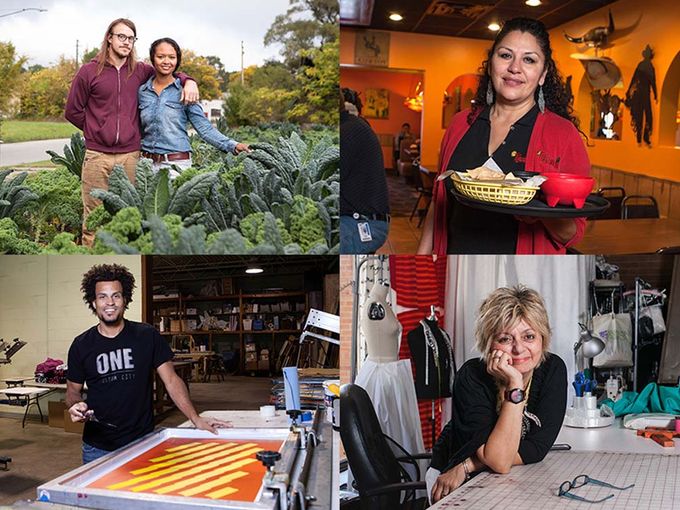
Reversing 60 years of relentless population decline and job loss in Detroit is a very tall order, but six months ago the New Economy Initiative (NEI) said it would pay out $300,000 to answer a provocative question about job growth.
What if, rather than relying on an explosion of digital start-up companies or huge corporate investments in Detroit, we put the modest sum of $10,000 into 30 small businesses that have toughed it out for years in the city — and see what those plucky owners can do to boost sales and create new jobs, a few at a time?
On Monday at a private celebration event, the NEI, a special project of the Community Foundation for Southeast Michigan, will present awards to the 30 winners of the $10K challenge competition called NEIdeas: Rewarding Ideas for Business Growth.
NEI has backed a variety of ideas and programs to spark and nurture entrepreneurship along the Woodward corridor in downtown and Midtown, but David Egner, NEI’s executive director, said the key to Detroit’s long-term revival is spreading the energy and job growth out into the long-suffering neighborhoods of Detroit and its two surrounded enclaves, Highland Park and Hamtramck.
‘Thinking survival’
The NEIdeas competition, which also includes $100,000 awards for two larger businesses with sales up to $5 million, drew more than 600 applicants. The $100k challenge winners will be announced in November.
That’s a very encouraging response, considering that many longtime Detroit business owners hadn’t been thinking about growth for years.
“Because of the shrinkage of the city, hardly anyone was thinking growth — they were thinking survival,” Egner said. “It’s all part of changing the culture now, particularly bridging the neighborhood-versus-downtown divide when we talk about the two Detroits.”
Evaluation and selection of the grant winners has been carried out by NEI in partnership with the Detroit Economic Growth Corp. (DEGC), which headed up the judging process and an outreach program that enlisted more than two dozen ambassador groups in the three cities to provide details and guidance to businesses throughout the application process.
Of the 30, $10K grant winners, 73% are minority owned, 60% female owned — and four of them have been around for 50 years or more.
Some of the NEIdeas grant winners have sophisticated plans for building revenue and creating jobs.
Curt Malouin, an electrical engineer and former software developer in the auto and publishing industries now doing business as Red Panda, is now making devices that enable musicians to change the tone or texture from their instruments. He plans to lease new technology that will eliminate the use of toxic inks and allow him to move more device manufacturing from southern states or Ontario into his Detroit workshop.
Five of the winners are urban farms — Rising Pheasant Farms, Peck Produce, Dulce Diamante Garden, Buffalo Street Farm and Brother Nature Produce. They plan to grow revenue and jobs by adding new crops or technology to extend the growing technology, and in one case to help till land with a new tractor for other farms.
One more piece
Other small businesses see one vehicle, one appliance or piece of machinery as the key to unlock future growth and hire more workers.
For Antonio Gregory, 32, of southwest Detroit, it’s the best used truck he can buy for $10,000. After losing his job at an installer of AT&T U-verse systems in 2010, he struck out on his own as Omega Wiring, expanding into phones, security cameras and alarm system installations. “It’s all pretty similar,” he said.
He gets plenty of calls for jobs and uses about five other guys as subcontractors, but their volume is limited by the fact that his only vehicles are his family’s Ford Freestar minivan — also used by his wife and four children — and a vehicle one of his contractors lets him use on occasion.
“You can only fit so many people in one car,” Gregory said. “A lot of people I work with either don’t have cars or licenses. They can do the work, but then can’t always travel and pick up heavy equipment or pick up lumber.”
Another service vehicle would enable Gregory to grow volume and perhaps put some of his key helpers on the payroll instead of paying them one job at a time. “As I grow, I want to make them full-time employees and they can count on a paycheck. Hopefully, next year when I get my service vehicle, it will be a whole different story.”
For Jolanta Cieslawska and her husband, Czeslaw Cieslawski, a walk-in freezer would enable them to satisfy the mad rush of customers to their Stan’s Grocery store in Hamtramck, for the Polish food specialties in high demand for holidays and festivals. Stan’s was founded in 1985 by Jolanta’s uncle and aunt; she and her husband bought it in 2006.
“We have a lot of Polish people around here and they come here from other cities, too, like Port Huron and Ann Arbor and Jaackson,” said Jolanta, especially for their hand-made pierogi. “I don’t have much space to store the pierogi when we are very busy, so if I have a walk-in freezer, I can make more stuff and hire more helpers to make more stuff.”
When I remarked that pierogi are standard fare at Polish restaurants and markets in many towns and asked why so many customers would travel to Stan’s for them, Jolanta replied, “Ours are the best. We make everything by hand. Other stores they make by machine, their dough is not as soft as our dough. And the fillings are different, we use more spice.”
No lack of confidence in the product there.
Doing business in Detroit, Highland Park and Hamtrack has been no picnic for the past 60 years. But perhaps NEIdeas can can catalyze some growth in the neighborhoods, one job — or a few dozen pierogi — at a time.
Contact Tom Walsh: 313-223-4430 or twalsh@freepress.com, also follow him on Twitter @TomWalsh_freep.
